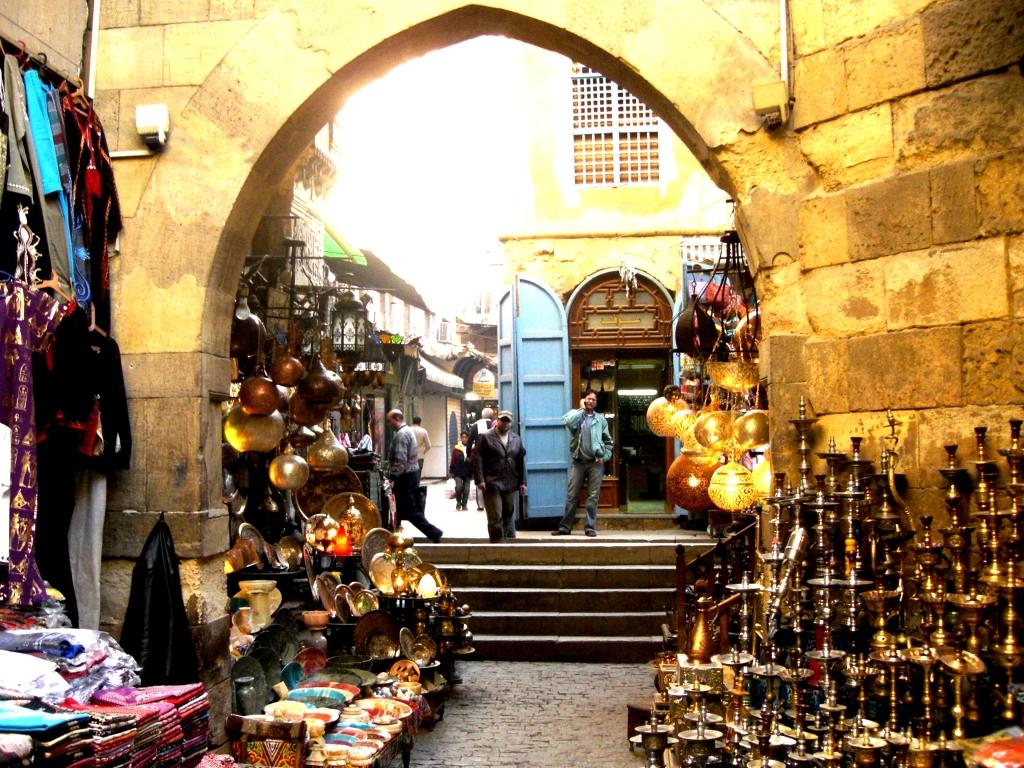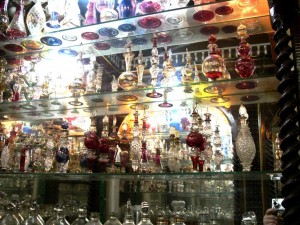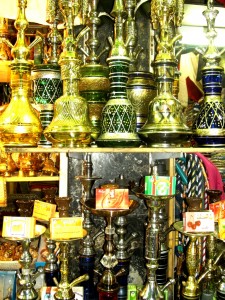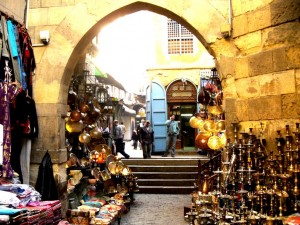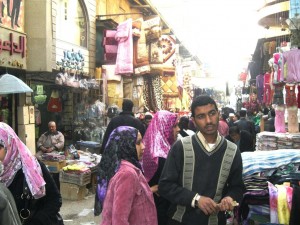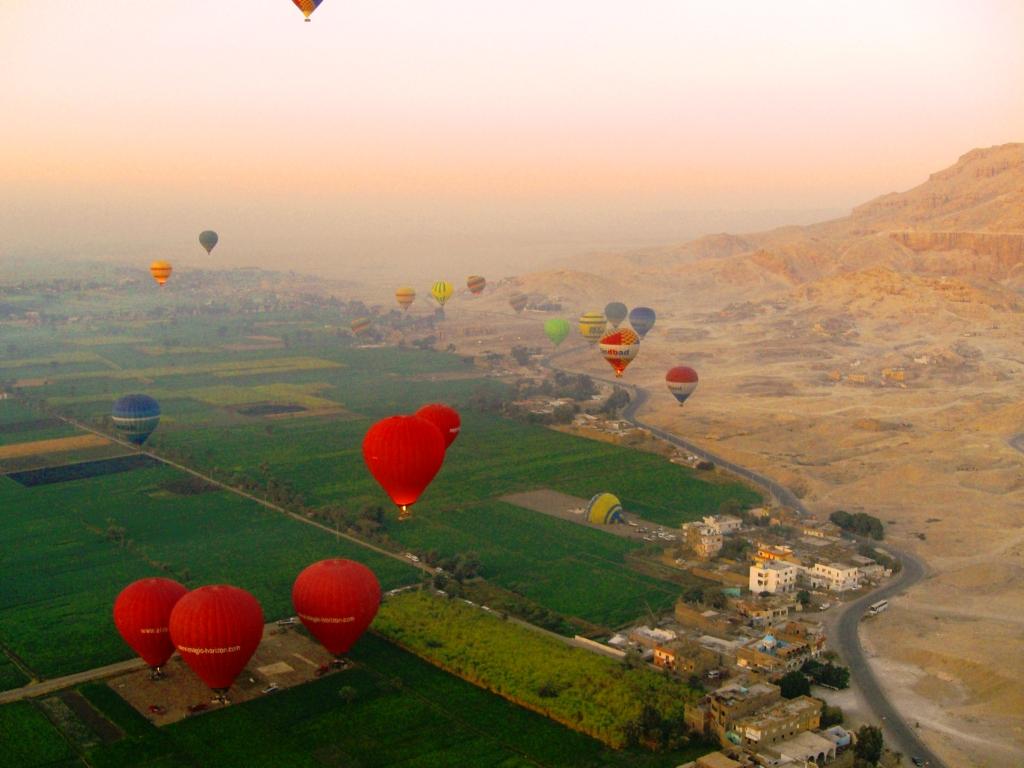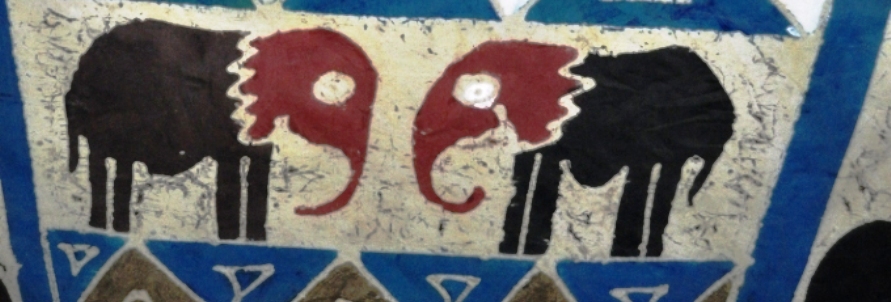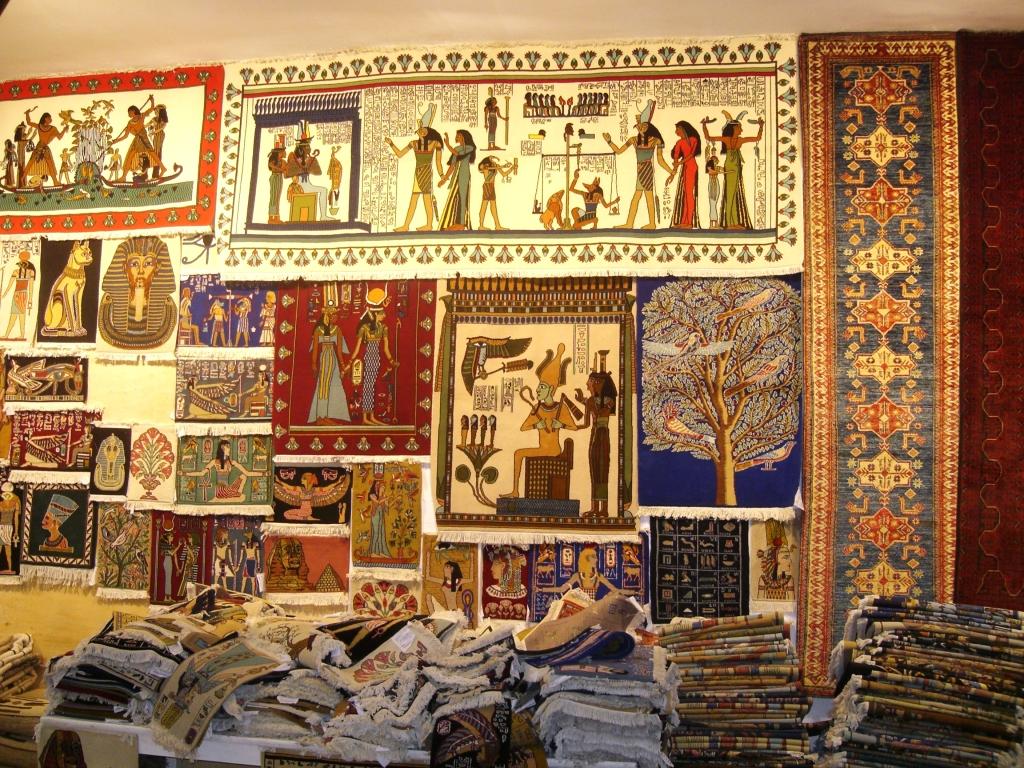I am beginning to feel uncomfortable. My self-appointed guide — he introduced himself only as Mohammed, which is not helpful in a country where Mohammed is the name of most of the male population — keeps urging me just a little way further.
Another turn, a narrower alley, fewer people, dimmer light: In the tiny shop windows, I see piles of scarfs and shelves of waterpipes and piles of things I can’t identify. I’m not sure I could find my way out, which makes me nervous.
“Almost there,” he persists, and we turn again. Images of a thriller movie — “Lost in the Souk” — dance in my head. I had thought I could handle myself alone in Cairo’s Khan el-Khalili market, but now I am beginning to wonder.
The alleys are now the width of a Victorian hallway — I can reach out and touch both sides — and I find myself in a a tiny shop with glass bottles in a rainbow of colors. Having bought spices out in the main street of the souk, I apparently am a potential customer for perfumes and oils.
“I am allergic,” I tell him.
“It’s all natural,” he tells me.
“It doesn’t matter,” I say.
“For your mother?” he suggests.
“She is dead,” I lie.
We go on, a verbal tennis match: He serves; I take my best shot; he hits it back.
“Your sister?”
“I have no sister.” (I have, in fact, two).
Nor do I have nieces, friends, colleagues, money. The excuse doesn’t matter; there is always an answer.
The air hangs heavy in the dim perfumed space, barely big enough for the two of us. We are uncomfortably close, like strangers in an empty subway car sitting right next to each other. I feel Mohammed’s temperament slightly change. My solo-woman-traveler’s sixth sense — honed by the usual collection of experiences with men behaving badly — bristles at the way he is looking at me. I don’t like the silence. I don’t like the fact that no one else is there. I am also feeling stupid: I can’t quite recollect how, even though I thought I had my ‘I-am-an-experienced-world-traveler-and-no-one-will-mess-with-me’ guard up, I ended up here, alone, in an isolated cubbyhole in a strange souk with a strange man.
I say it’s time to leave and he reaches to touch me — perhaps to keep me in the shop, but it feels like something more sinister. I snap at him, and he recoils. That’s the end of that, but my heart is pounding, and I leave quickly, shrugging him off as he trails behind, half apologizing, half still trying to sell me something.
The Come-ons of the Souk
Shopping in Egypt’s Khan el-Khalili bazaar is colorful, enlightening, and it can even fun, but get this clear from the start: It is also a bit of blood sport, and to engage in it is to lose. This particular souk has stood in this spot since 1382, and the typical vendor bargains a hundred times a day. The average American has at best negotiated a refund on a faulty coffee maker at the local mall. You won’t win here: the question is only how much are you willing to lose?
In Your Bucket Because…
- You can’t get more authentic than this: The sounds of bargaining have echoed here for nearly 800 years.
- The exotic goods for sale are eye-popping and mind-boggling.
- Good for intrepid travelers who don’t mind haggling.
“Barack Obama!” a vendor calls out with a smile.
“Americans! You are welcome in my country!”
“What state do you come from” (The vendor has a cousin there; if you have a companion, he will also have a cousin where your companion lives.)
And always “Free looking!”
“How can I take all your money,” one asks, refreshingly honest.
Negotiating the Souk
Off of Houssein Square, two main arteries, one on either side of the square, lead into the maze of the Khan el-Khalili market. The coffee shops in the square make a good ‘meet here if we get separated’ place, if you don’t mind fending off a constant stream of vendors shoving made-in-China trinkets in your face. To be honest, not even my seven-year old niece was impressed with the Cleopatra-style beaded headdress that somehow found its way into my purse.
Narrow alleys snake between the souk’s two main roads, crowded with tiny jewel-box sized stores selling colorful spices, perfumes and oils, glass water pipes (used for smoking tobacco), musical instruments, and enough scarves to outfit a company of scarf dancers. Farther back, tourist merchandise gives way to clothing, food, and household goods bought by Egyptians themselves. This is the part of the market where tourists (those who make it this far) can relax a bit, as none of the vendors expect you to be interested in plastic washtubs or bolts of fabric. But don’t drop your guard entirely, or someone’s cousin will show up to lead you back to the spices (“Genuine saffron! I give good price”) and carved camels.
The Khan el-Khalili was built on the site of a much older tomb and palace, but what I find most interesting is that it was known as the “Turkish bazaar” during the Ottoman Empire — while the medieval spice market in Istanbul was once called the “Egyptian market.” I guess everyone is exotic to someone else.
Bargaining: A Way of Life in Egypt
You can’t fight it. Bargaining is a way of life here. As an American, my instinct is to shy away from it: It seems rude to me, but here is it quite the opposite. It’s not rude. It’s not inappropriate. It’s not insulting. It is expected — a game. Most Americans are hesitant, embarrassed, uncertain, afraid. Get over it. The $50 water pipe will go for half that, less if you are good. I bought a Nubian lyre for which the vendor wanted an absurd $300; I paid a still-absurd $60, and I suspect that was three times what it was worth. Consider this a chance to participate in local culture. The amount you overpay for your scarf or alabaster vase is the price of admission.
Once you’re identified as a tourist with money to spend (not a stretch, as you are obviously a tourist, and tourists by definition have money to spend) conversation is usually good humored, and sometimes downright funny. Just be aware that any interaction is part of the sales dance. Cheating is rampant — you will certainly be told that a plastic bauble from China is some sort of treasure, and that the fake saffron is real.
And when you are done, take the advice of my groups guide — the official one, who I’d left behind in Houssein Square when I ventured alone into the market. “Walk like a camel,” he’d told me.
A camel looks neither left nor right, it simply walks and everyone gets out of its way. To an American this seems rude. To an Egyptian vendor, it simply indicates that there is no interest in buying. And for a woman alone, it’s an essential skills: It may keep you out of perfume shops, carpet shops, and jewelry shops — not to mention tiny little alleys you never intended to enter.
Practicalities
Let vendors offer the starting price, then feign disbelief. Apologize for misunderstanding the value; express reluctance to insult the seller with too low an offer. This will usually elicit an invitation to state the low offer. With expectations lowered, the visitor can offer whatever he pleases. Then the haggling begins. Have in mind a maximum and don’t be tricked by discounts for multiple purchases.
- There’s safety (and bargaining support) in numbers: Go with a friend.
- If you think you might be a serious shopper for something, research prices before your trip.
- Don’t be swept away by the novelty: A bellydancing costume may be better to admire than to take home.
- It’s one thing to bargain hard for a major purchase, but don’t let the haggling get too combative when the difference is only a dollar or two.
- Haggling may continue even after the visitor thinks it is ended. It’s not uncommon to see visitors walking away, followed by vendors who are lowering the price, again, and again, and again.
- Be aware that guides may be on commission.
- Think of a trip to the souk as a visit to Las Vegas: Have a set amount of money to spend, and stick to it. The difference: Visitors in the souk don’t lose everything in the slot machines, but get a memento to take home.
